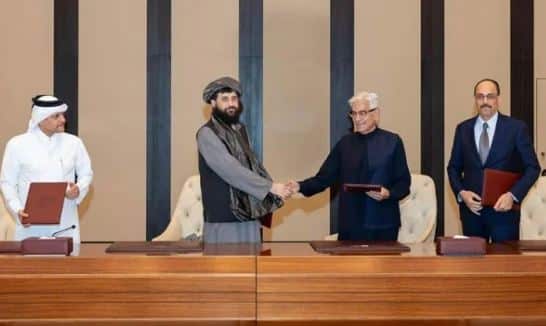We do not seek escalation, Taliban should honour commitment: FO
Spokesperson terms Doha talks first step in ensuring regional peace.
No major attack from Afghan soil in last two or three days: Andrabi
The second round of talks between Pakistan and Afghanistan began in Istanbul on Saturday, as Islamabad seeks a mechanism to address terrorism emanating from Afghan soil, sources said.
The Istanbul dialogues follow the first round of Pakistan-Afghanistan talks — mediated by Qatar and Turkiye — held in Doha on October 19, in which a ceasefire was agreed, but the border trade remains suspended.
Advertisement
The Afghan delegation is being led by Deputy Interior Minister Rahmatullah Mujib.
During his weekly press briefing on Friday, Foreign Office spokesperson Tahir Hussain Andrabi said that Pakistan looks forward to the establishment of a concrete and verifiable monitoring mechanism in the Istanbul talks to address the menace of terrorism emanating from Afghan soil towards Islamabad.
“As a responsible state committed to regional peace and stability, Pakistan does not seek escalation but urges the Afghan Taliban authorities to honour their commitment to the international community and address Pakistan’s legitimate security concerns by taking verifiable action against terrorist entities, including the FAK/TTP and FAH/BLA,” he added.
The foreign office spokesperson also termed the first round a first step in ensuring regional peace and stability. He said the Doha talks focused on immediate measures to end cross-border terrorism against Pakistan stemming from Afghanistan and the restoration of peace and stability along the Pakistan-Afghanistan border.
Answering a query, Andrabi said that there had been no major full-scale terrorist attack emanating from Afghan soil in Pakistan in the last two to three days, terming it a fruitful outcome of the first round.
The foreign office spokesperson said that border crossings with Afghanistan would remain closed, citing the security situation, stressing that saving the life of an ordinary Pakistani is more important than the movement of goods or trade.
‘All-out war if talks fail’
Defence Minister Khawaja Asif, who had earlier expressed cautious optimism about the peace agreement, warned of “all-out war” with the Afghan Taliban regime if the negotiations failed.
Speaking to reporters in Sialkot, he expressed hope that the outcome of the negotiations would be known by tomorrow, if not today.
The defence minister noted that no hostilities had occurred along the border over the past four to five days, stating that 80% of the points agreed between the two countries during the first round of talks in Doha were being implemented.
Asif assailed India for fighting a proxy war against Pakistan using the Afghan Taliban. “The Afghans are acting against us as a proxy of India.”
The minister expressed hope that the two nations would agree to a deal that would ensure long-lasting peace in the region.
Recalling the first round of talks, in which he led the Pakistani delegation, the defence minister said that he felt an urge for peace during the negotiations.
However, he regretted that Afghans backed terrorism in Pakistan, despite the country having hosted them for more than four decades.
Border crossings between the two countries have remained closed since October 11, following clashes earlier this month that killed dozens on both sides in the worst fighting since the Taliban’s 2021 takeover of Kabul.
The border clashes were triggered after Islamabad demanded that Kabul control militants who attack Pakistan across their shared border, saying they operated from havens in Afghanistan.
A ceasefire was agreed in talks hosted by Qatar and Turkiye last weekend and is holding between the two sides, but the border trade remains suspended.

